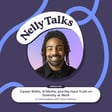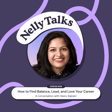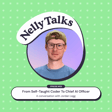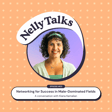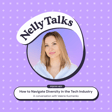Diverse Backgrounds & Quality Thoughts
00:00:05
Speaker
If you have people in the room that aren't all kind of from the same socioeconomic background, you would have better quality thoughts.
Data's Power in Business Transformation
00:00:12
Speaker
Data can really transform the direction the businesses are going.
Introduction to Nelly Talks Podcast
00:00:19
Speaker
Hey everyone, I'm Nellia from Nelly Wax. Welcome to my podcast, Nelly Talks, a careers-focused show for those who are considering careers in tech industry, or maybe looking for a change of direction in this space.
Interview with Yulia Kim
00:00:36
Speaker
We will be interviewing different speakers in this field to understand their journeys, their hurdles to face, how they overcame those, and any tips and hints that they would like to share on the way.
00:00:54
Speaker
Hello, everyone. So today we have Yulia Kim on the podcast with us. Yulia, over to you. Please introduce yourself to our audience. Hi, everyone. I'm Yulia. I am a senior manager in business intelligence at Gold Cardless.
Yulia's Analytics Career Journey
00:01:09
Speaker
It's a FinTech ah based in London, focused on the account to account payments. I would describe myself as an analyst at heart. I started as a financial show and marketing analyst, a test and learn analyst, and strategy analyst. I kind of experienced a number of different flavors. A couple of years ago, I transitioned into the management path. I had my current employer, Adgo Carlos, where I've spent ah the last sort of six and a half years. have always been in the data and analytics space, but occupying slightly different roles and perspective in different industries across London tech space, I guess. Thank you for that intro. I know we know each other personally for quite some time, and I can't believe being in talent space, I've never asked you this question. But how did you get into this world of analytics? I mean, how did you kind of decide to join this space? It's been quite a
00:02:04
Speaker
Accidental, it wasn't as deliberate as as you might think, but I found a good fit.
Discovering Data's Business Impact
00:02:09
Speaker
As a university student, I always try to keep my options open. I've kind of explored different areas for internships or just to speak to various people. I was doing a film production and internship at some point 18 years ago. I landed at an internship in a startup in London called Songkick. My title was a data warrior, I think back in the day. And it was basically doing manual data cleaning tasks for concert listings. They were various demo days and I saw PUX research and deliver a presentation about how different marketing channels are performing. And they they noticed like a spike using the data and they were like, Oh, this is because blah, blah, blah. we We really should be considering investing more in this area. And just like that, all the founders were there. They were like, okay, let's do this. Let's buy like advertising there or let's do this.
00:02:58
Speaker
And I was like, just, just like that, it like happens. So I think I was then quite intrigued by the power of analytics and how data can really transform the direction the businesses are going. And I said, like, what is SQL? if People laughed and said, uh, beware what you're asking about. So how about what you might end up doing? And lo and behold, over 12 years later, it's been my bread and butter for majority of my analyst
Problem-Solving in Analytics
00:03:21
Speaker
If you stay in the same vertical for so long, you obviously have to enjoy it. What would you say are the best things about working um in this area? I've um always wanted to be somebody who solves problems and that's something I really enjoy. And I think analytics provides you with a lot of opportunities to do that because you're not limited to a particular slice, either horizontal or vertical. There are like different industries from like education to tech. to FinTech, to taxi and delivery, like ride sharing space. And then different slices of the business, like from finance, marketing, product. You can basically find your own niche. And I think that helps keeping people engaged. They can be as generalist or as specialist as they want.
00:04:04
Speaker
There's so many new titles, new flavors that have emerged. It's very broad and diverse and that it is very impactful. I think what I liked at the start and what I kind of continue seeing is you can take a problem or an area
Data-Driven Business Decisions
00:04:20
Speaker
of opportunity. You can use data to solve that problem or to channel the resources in the right way to to make a really kind of fundamental impact on the business. That's exciting. I think all functions, tech or non-tech now are data-driven, data-length, the time that gets killed i and in the tech industry of a use to death, but still very important. So I can see how partnering with different functions in this role is really good return on investment for businesses. And I guess on the flip side, you know, no job is perfect. What would you say are kind of the common challenges that come up in this role, whether it's when you work as an IC or whether when you transition into leadership.
Challenges in Data Roles
00:05:01
Speaker
Really, in order for data to make a difference, it needs to be used. It needs to be collected. It needs to be cleaned. It needs to be channeled in the right way. It needs to have the right skills and people applied to it in order to turn just a set of numbers and figures into insights. Because that's what really matters. The stories that can convince people to change direction or the the stories that convince people to take another look. The decision makers. This is what's challenging like culturally. I'm very lucky that in many companies that I've been at, especially in the last maybe 10 years, they've been more of data hungry and businesses. I think the mainstream consensus shifted to the data is a necessary resource and it's no longer an optional thing. So there hasn't been as much cultural resistance to data itself. I think early in my career, there's been like some situations where we we're resistant and they said, why do I need you as an analyst to tell me where to cut costs? Or why do I need you to tell me how to do my job? I don't, i like I have the instinct.
00:05:56
Speaker
So I think there's been a like a really change in current for that, but I think now the challenge is slightly different. Now with everybody being data hungry throughout the business, there's a lot of kind of demand and there's limited
Leadership in Data Management
00:06:08
Speaker
resources. So we've gone through various stages of growth and contraction and and kind of another growth, but there's always, always more problems or more things that you could be doing.
00:06:19
Speaker
with data, like more things to analyze, more things to ingest, more things to process and clean and et cetera. So I think the main challenge I'm seeing more in the leadership role, in the manager role is like, where do we direct our resources to be most impactful for the business? If you judge by the number of requests we're getting, there's always too many for the number of people. It's, it's kind of the management that demanded supply and scanning the horizon and being more proactive and using the data kind of in a space where it's not being asked for. It's to say, okay, I've had the time to mine the data, had the time to have a look. And I've noticed that we could be doing this differently. The the people who are bringing us problems, let's say sales team, right? Sales leadership, they might not necessarily be the data experts to raise the right questions. So they would know the the problems that they currently have, but they might not see the opportunities that might exist. Unmind.
00:07:11
Speaker
Yeah, managing that reactive and proactive is probably a consistent theme that comes up and also like protecting your team from being sacked in to so much tactical work since you're actually not impacting business longer term. And how have you found that move going from individual contributor to a manager, kind of how easy was that
Transitioning to Management
00:07:34
Speaker
shift? Do you feel that kind of, do you have any support along the way that facilitated that?
00:07:39
Speaker
Yeah, I've had the smoothest, I think one of the smoothest transitions you could dream of. It was with my current employee that got cardless and the opportunity arose as the head of BI at the time kind of moved geographically. So a couple of us in the team were given those kind of leadership opportunities to to test ourselves out. And it was good in a way that we were allowed to be player managers. So it wasn't just like, hey, um you're an individual contributor and then today and tomorrow you are leading a team of 10.
00:08:08
Speaker
No, it was you mentor i and of a younger counterpart like your colleague, ah you become kind of a player manager, you do 60-40, then you're 70-30, you split your time. Now it's not like scientific, but it allows you to do what you do well or as an analyst, and then also ah to share the knowledge and be able to direct kind of Uh, dip your toe into that sort of management space. Um, and if it's not something for you, I've been kind of, it's been made clear that there are no closed doors. So it kind of, you always have that opportunity to move back. Now I say year two or year three, we've been going through a tremendous period of growth and we ended up hiring sort of a team of 10 people. And then suddenly I'm doing all the managerial interviewing.
00:08:56
Speaker
sort of thread, reaching out for talent and scanning this through the CVs, all the things that you know much more about than I do. But I think now it's really amazing to see the people that you've hired, you know, three, four years ago are doing really, really well. And I think that's what makes me feel that I've made kind of the right decision is because you have that long feedback loop, but um you're able to kind of scale your impact more through not doing things yourself directly, but through helping other people succeed.
Work-Life Balance in Tech
00:09:28
Speaker
And that's probably why I love hiring because, you know, especially in eternity, you see that impact you can have on the tech community in your field. And yet there's nothing better than seeing the successful house work out. And I guess as you moved into kind of management and no doubt your role became more demanding, do you feel like this type of role allows you to have a good work-life balance? It's less about the type of role, but more about the boundaries you've set for yourself, the type of employer that you've landed, or the type of manager you have. And I think the type of industry you're in. So I think there's potentially less space to talk about work-life balance if you become a manager in strategy consulting, where the expectations are that long hours, high intensity work. I think not the flexibility itself, but the culture
00:10:20
Speaker
ah which is very intimately related with the flexibility that I've chosen Go Card List for. I've had life events more recently in my life and um the company culture as well as kind of good relationship with your team and your managers that allow you to maybe step away if need be. There is an element of luck, ah an element of quite deliberately choosing or talking openly with managers or with your teams about the work-life balance and if that's a priority. It definitely has become more of a priority in my thirties compared to my twenties.
00:10:59
Speaker
For example, when we had more time to ourselves, we were much more willing to kind of go for it and work and have late nights, et cetera. I think when you start having a family, when when you need to balance the the various needs, it becomes more of a, more of a thing.
00:11:14
Speaker
I think you're absolutely right. I think doing the due diligence up front when you're considering employers, teams, what kind of managers you will have is really important. Yet, perhaps not role specific as you said, but more put into any role, and anyone considering new new career. I can totally relate that how it becomes priority. And also when you start thinking about people who go into leadership at their demographic and experience level, those will be real consideration to a lot of them. You you know, you kind of have a lot of folks in the early 20s straight out of uni, internship, whatever path they chose, going managing a team. Everyone wants those experience hires. So yeah, it's a really important thing for businesses to remember as well. I think it's also as a leader now or as ah as a manager.
00:12:01
Speaker
you need to model the behaviours that you want the team to have. So if you want the team to work out of hours all the time, be available, that's what you do. If you don't want them to, they will look to you to kind of be guided by your behaviours as well. So um
The Impact of AI on Business
00:12:18
Speaker
be mindful of your behaviour. It might have consequences that you didn didn't really necessarily anticipate.
00:12:24
Speaker
Yeah, that's that's a really good point kind of from leading from the front. It could be a positive and a negative that you're mirroring. I think it really sunk in with me when I started running my own business. I now on purpose don't reply to people who are on vacation. Me because I have no business being like on Slack, other messaging tools, and I try and do the same. Even though I do have to hold myself.
00:12:47
Speaker
yeah Sometimes that's all you have to do. It's a really good point. Thank you. There's there' been kind of a lot of hype around AI, specifically in 2023. Gen AI, how has AI impacted your role or the function itself in the business? Do you think any other tech developments in your field that excite you at the moment?
00:13:08
Speaker
And so I think with AI, I think we're yet to see ah the whole impact. There's a lot, a lot of hype over it, but I think from the machine learning and AI being kind of something that is remote and far away, the whole Gen AI kind of, it's much more accessible to people. So anybody can go log into chat GPT and kind of have a taste of it.
00:13:28
Speaker
I haven't seen a huge amount of applications directly in my workplace. I think that there's been a lot of tools that now make your life easier so they can summarize ah the notes maybe from this podcast maybe things will be all to summarize maybe you will find interesting snippets so a lot of time savings can be can be hard and I think this is amazing but I think we we also want to be cautious because that access, so being able to use AI by non-professionals, by people who don't have the full appreciation of the whole impact of what it can do, it can be risky and it could lead to sort of biases being unconsciously applied to take this, the output as given. So for example, if you're looking for medical advice, a charge equity would actually say like, go and consult your healthcare professional rather than necessarily taking what what is it given. AI can analyze data much, much, much faster.
00:14:20
Speaker
then humans ever will be able to. But I think you need to moderate AI and you need to be able to have that understanding that AI isn't perfect and there's a human element that needs to be applied still. There is a lot of ethical considerations. For example, would we, you know, predict that somebody can be a criminal based on their behavior? And then would we stop them before they become a criminal, ah before they actually commit a crime? Like, so sort of like Black Mirror-esque,
00:14:51
Speaker
scenarios, we're hopefully not close to that, but we just need to be a little bit careful about how AI gets applied. It can be used for good or for bad. The importance of privacy and security has
AI in Analytics: Opportunities & Risks
00:15:04
Speaker
accentuated. It's become even more important now because a lot of people can ah use AI or maybe the bad agents can get to the to the same results faster. I think the governance and security and privacy around data and how data can be used are going to grow in its importance. um Another trend that is interesting like from the data side is this
00:15:29
Speaker
data democratization as well. It's about kind of growing the data cultures and now you don't have to have an analyst or a data scientist or you don't have to be one in order to get the benefits of it. You could give an AI the dataset and ask it to kind of tell you about the trends or you could ask it to you know talk about outliers, et cetera. And that it could risk our jobs. I think rather than that, it's more likely to enhance and free up the time because for a lot of analysts and data scientists, the time on the job is spent cleaning and doing kind of the the manual ah bits around itself.
00:16:09
Speaker
So it's a bit of a mumbled answer, but I think the jury's out there, whether it's a force for good or or not. And I think humans need to be vigilant in how they ah apply AI. And there is still a lot of friction in terms of getting training. You and I are 30-something, relatively tech savvy. We own computers. We have access to technology, but not not everybody does. um And I think we kind of can can be in our own bubble, I assume, but everybody else does.
00:16:37
Speaker
Great point. and i think you Again, you're often preaching to convert it here because ah my 12-year-old son was telling me about the AI app that most of the kids in your school, this is the age of 12-13, used to support with homework, right? This is probably the the youngest of generation Z,
00:16:57
Speaker
They will use it, you know, because, and they don't even see this as like AI or gen AI, just a tool that's on their fine that's accessible. There is a stat now that 60% of the generation use AI for job applications. were writing their papers university, you know, like what guidance there for universities for employers, for teachers. Recruitment is one of those areas, you know. I had last week only five fake candidates. If I just pushed them through the AI tech that I have, they would have probably gone through the interview. Perhaps even, you know, by using an interview co-pilots could have ah gone through the technical interviews. The technology is so advanced. So having a human curating the process, it's really important because, you know,
00:17:42
Speaker
teaching that lived context to AI is very difficult because it's, you know, it's our biases. So yeah, I think as long as we got to the point in recruiting where having unconscious bias as a human sometimes is better than AI having the data bias, just because of the rest, you superimpose the various biases.
Diversity in Tech & Finance
00:18:00
Speaker
take to technical allow yeah I thought I'd say that in my hiring career, um but brings us nicely to the diversity, kind of unconscious biases, yeah inclusivity topic. As you've been ah obviously working in TAG for a number of years now, do you see more diversity and representation in your field now compared to perhaps when you were starting up?
00:18:28
Speaker
I would say broadly, yes, it's hard for me to sort of judge sort of temporarily all the time because I've shifted out my focus slightly. So to give you an example, at Google, I was part of the finance team and there were all the leaders, including all the way up to the CFO of Ruth Fora, like there were a lot of female leaders. And it was noticeable and maybe a bit stand out. At Gocargles, we have the seat female CFO, um an incredible role model as well. But if you look pivot and look at tech or more specifically engineering, I think there is a ongoing problem with kind of diversity not being where it could be. I think.
00:19:08
Speaker
The analytic space is fairly egalitarian. Yes, maybe you need to be a little bit better with numbers just to start with, but there isn't such an acute problem as it is with software engineering. We have some DLI metrics in our own company and they've been getting better over time, specifically around women and leadership. So it's not just about the either the industry role, but actually the seniority. I think where the uh, imbalances felt more acute is particularly women in leadership. But if you talk about sort of diversity from the socioeconomic or like race or LGBTQ spectrum, that I think I am noticing positive developments overall. I think we, the big goal kind of has been jogged that our team was like one of the most diverse teams in the product development, like on all spectrum. I think things are getting better, but we're probably getting a little bit more tired talking about diverse I think, especially with the focus on AI, some kind of the lean teams, cost optimization, it does feel like there is a bit of diversity fatigue um in tech. It sounds like you've got a great team, that the company's done something right in terms of bringing up diverse talent and
00:20:19
Speaker
perhaps promoting it into leadership roles. Have you seen any programs or anything that perhaps companies where you worked in have done well to nurture this culture of diversity, to encourage more ah talent from different underrepresented groups into different roles?
00:20:38
Speaker
Yeah, I think a couple of things. So I think one is just, just being aware, I think being aware that these biases exist, that this is a, like, I know it's a bit of a contentious topic. So I think when I joined Google, they were like one of the first things they did in their onboarding was like the unconscious bias training. And at the time I was like, well, what is that now? I think there is questions about how effective that is, but undoubtedly like it got me thinking that there are biases that can be in your subconscious that you might not think you have, but just raising awareness of those things is is one. Two is yeah ERG groups and creating belonging and sort of promoting those various opportunities. So for example, I think Monzo or um some of the other sort of the fintechs, they basically go out there and sort of trumpet that that that they are
00:21:29
Speaker
inclusive spaces to work for, let's say, ah for people on the LGBTQIA spectrum, right? Or that might be good for trans people. So I think if you start kind of being noticed in various communities, people will read about it in blog posts and will be more likely to apply to your company if it's known to be.
Promoting Diversity in Teams
00:21:47
Speaker
or like a member of a certain organization, etc. I think also being deliberate about the processes that people might not think that are impacting. So for example, a lot of people, when you apply for a data science role, they they kind of require a PhD and three degrees and and whatnot. But in reality, in order to do the job, you might not need that. But it's known that women are ah less likely to apply if they don't tick exactly like 100% of the boxes. So that could be considered as a job role or job spec with a lot of lines on their requirements list might be not very conducive to diversity, right? So being able to do that actually as an employer, as a hiring manager, really
00:22:27
Speaker
kind of going through the job spec and being honest with yourself, ah or whether you really need every single thing that you're asking for. I think the final thing is really not really kind of chasing diversity for its own sake, but really understanding why you're trying to promote that because it is a think that's just good and it's all right, but it's it's a thing that also improves business outcomes. If you have people in the room that aren't all kind of from the same socioeconomic background, you would have better quality thoughts at the table. So keeping the why in mind, I think is what we all should be doing.
00:23:04
Speaker
I think it's exactly that. Diversity should be a by-product of us just being informed. And like you're saying, like no one loves a shopping list when they apply. I don't think really any group likes it, but yeah, it could be exciting and discouraging. It's nice to hear that you as someone does hiring, I'm sure, is things like that. And it's not always a ah majority take. It's probably why people like me are in this space. But yeah, I've had the fun inclusive hiring training when I joined Facebook.
00:23:34
Speaker
a couple of them, you have to
Advice for Aspiring Analysts
00:23:36
Speaker
renew them. And I have rolled it out to hiring managers and you still this keeping yourself in check and being aware of it is probably one of the hardest things because they're conscious, right? um Amazing. Thank you for sharing those thoughts. And look,
00:23:50
Speaker
To wrap us up, what advice would you give to someone considering um a career in this field? Is there someone starting up or perhaps considering pivoting um into an analytics focus domain? I think so many things really, but i think I think the barriers to entry in this space are fairly low. I think you need to have common sense, you need to ah have curiosity and be kind of interested in solving problems.
00:24:18
Speaker
You should really try to do a little bit of research to understand the various different roles. There's been a proliferation of different niche roles. Do you want to be a data engineer, which is quite different to, let's say a product marketing analyst, to understand how your personality, your profile and your skills would fit in this space. I think you would also see, if you are a career switcher,
00:24:42
Speaker
I've done a bit of training with various schools on data analytics. ah There are a lot of um ways of rebranding your existing skills and knowledge of the business to an analytics career. So just really trying to understand and marry the two would really kind of set you apart. I think don't wait. Like I said, do a bit of research, but I'd say don't wait. There are such low barriers that you You could be doing some freelance gigs on the side in terms of analytics. You could be teaching yourself how to use a BI ah software or data analytics software. You could be doing like Tableau projects. There is a lot of ways to start without like ah a three, four year degree to see if it's right for you. If it's something that you would like diving in for the long haul, you know? um So say ah don't be scared, go for it and yeah, take risks.
00:25:38
Speaker
Great advice. People talk themselves out of this thing sometimes without giving it a good go. So it's nice to hear that you can kind of dip your toe in the water, test it out, and hopefully it can lead to a really successful career. Thank you so much for sharing all the tips. It's been great having you on the podcast today. I think our audience should be making a lot of notes. Thank you so much for your time here now. Thank Nelia. It's ah been great chatting with you as always. But yeah, if you have any questions, let me know.
00:26:06
Speaker
Thank you to all our lovely listeners for sticking with us. I hope you found this useful and please do share, like, et cetera. Check out our next episode that comes out in two weeks time.

